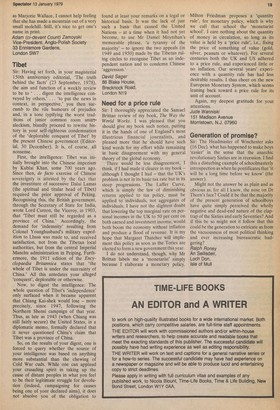Tibet
Sir: Having set forth, in your magisterial 150th anniversary editorial, 'The truth behind the facts' (23 September, 1978), the aim and function of a weekly review to be to . . . digest the intelligence conveyed by others,' . . . 'to put the news in context, in perspective,' you then succumb to the vile humours of prejudice and, in a tone typifying the worst traditions of junior common room smart. aleckism, blandly proceed to rewrite history in your self-righteous condemnation of the 'deplorable conquest of Tibet' by the present Chinese government (Editorial, 30 December). It is, of course, all nonsense.
First, the intelligence: Tibet was initially brought into the Chinese imperium by Kublai Khan, some 700 years ago. Since then, de facto exercise of Chinese sovereignty is attested by the fact that the investiture of successive Dalai Lamas (the spiritual and titular head of Tibet) required the prior approval of Peking. Recognising this, the British government, through the Secretary of State for India, wrote Lord Curzon, the Viceroy, in 1903, that 'Tibet must still be regarded as a province of China.' Accordingly, the demand for 'indemnity' resulting from Colonel Younghusband's military expedition to Lhasa was made to, and received satisfaction, not from the Tibetan local authorities, but from the central Imperial Manchu administration in Peiping, Furthermore, the 1911 edition of the Encyclopaedia Britannica states that 'the whole of Tibet is under the suzerainty of China.' All this antedates your alleged 'conquest', deplorable or otherwise.
Now, to digest the intelligence: The whole question of Tibet's 'independence' only surfaced when it became apparent that Chiang Kai-shek would lose — more precisely, since 1947, following the Northern Shensi campaign of that year. Thus, as late as 1943 (when Chiang was still fairly secure) the United States, in a diplomatic memo, formally declared that it never questioned China's claim that Tibet was a province of China.
So, on the results of your digest, one is forced to query whether the source of your intelligence was based on anything more substantial than the chewing of Cold War cuds. While one can applaud your crusading spirit in taking up the cause of distant peoples in what you feel to be their legitimate struggle for devolution (indeed, campaigning for causes being one of your declared aims), it does not absolve you of the obligation to found at least your remarks on a legal or historical basis. It was the lack of just such a basis that caused the United Nations — at a time when it had not yet become, to use Mr Daniel Moynihan's memorable phrase, 'a tyranny of the majority' — to ignore the two appeals (in 1949 and 1950) made by the Tibetan ruling circles to recognise Tibet as an independent nation and to condemn Chinese 'aggression.'
David Sager 86 Blake House, Brecknock Road, London N19


































 Previous page
Previous page